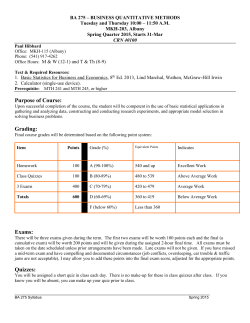
S : P III
SYLLABUS: PHYSICS III FOR ENGINEERS PS250-04, FALL 2012 ERAU Daytona Beach Campus M W F, 11:45-12:45 Room: 21112 (Modular) Instructor: Jonathan B. Snively Email/Web: snivelyj@erau.edu http://webfac.db.erau.edu/~snivelyj/ps250/ Phone: (386) 226-6306 Office: LB311 (Lehman Building) Office Hours: T/Th 2:00-5:00 (or by Appt.) Textbook: Young and Freedman: University Physics, Vol. 3, 13th Edition, Chapters covered include 21-30, 32, 37 (1-4), 38 + T.B.A. Prerequisites: PS160 (or 208) – Physics II, MA 242 – Calculus and Analytical Geometry II. Blackboard will only be used for mass emails and the posting of textbook solutions – The most important course materials will instead be posted on the course website! Quizzes will be given randomly in class throughout the semester. Homework assignments are posted on the website. Feel free to work on homework problems in groups or individually, but for full credit show all details of solutions (in legible form). Homework will be collected at the beginning of the class period it is due. Late submissions will be graded at 50% credit, but only if submitted before the inclass exam that covers the same material. Mastering Physics (PS250SNIVELYFA12) assignments are for extra homework credit, and will be as fun and helpful as possible. Weighting: Quizzes 5% Homework + MP 10% + 5% 3 Exams @20% 60% Comprehensive Final 25% Total = 100% Probable Grading Scale: A B C D F 90 ≤ your grade 75 ≤ your grade < 90% 60 ≤ your grade < 75% 50 ≤ your grade < 60% your grade < 50% Exams are closed book / closed notes. Non-programmable scientific calculators are required. Make-up exams will not be given except for approved absences with two weeks prior notice. The comprehensive, multiple-choice, Final Exam will be on Monday, December 10, 10:15AM–12:15PM. A hand-written 3”x5” card cheat-sheet is allowed for this final exam only! Grading: Note that exams are by-far the most important contributors to your overall grade. Homework, MP, and quizzes should be used as an opportunity to practice for these in-class exams! Max total HW+MP grade is 10% (i.e., you can obtain max credit with 50% HW average and 100% MP average). Use this leeway to take “risks” on your solutions – Challenge yourself, aim for clarity in your write-up, and avoid use of pirated solution manuals. I reserve the right to apply curves, to adjust grade scale brackets, or to reduce the weightings of the graded materials to maintain an appropriate and fair distribution of grades. Curves are designed to fairly benefit all students. Final grades will always be rounded to the nearest integer. PS-250-04: Fall, 2012. Syllabus. 1/2 Attendance will not be taken, but you are fully responsible for all materials presented in class, including any assignments collected and quizzes given. Office hours are as-posted, and individual appointments are encouraged if you would like additional assistance or tutoring. I am here to help, so please remember: Seek assistance before your grade shows signs of trouble. Please note that the Physics/Chemistry Tutoring Lab (21108 in Modular Building A) offers free tutoring for any ERAU student in PS courses. Class Policies: iPads, food, beverages, etc. are allowed only if used with zero distraction to yourself and to others. GLWT!1 Please ask before using a laptop in class (keyboards are noisy!). Academic Integrity: Cheating, plagiarism, and fraud are unacceptable in all forms, constituting serious academic integrity violations. In accordance with Departmental and University policies, they can result in a failing grade or dismissal from the University. Course Learning Objectives and Outcomes: 1. Solve problems involving static electric charges using Coulomb’s law and Gauss’s law. Appreciate similarities between gravitational and electric fields and forces. Calculate electric fields for various charge configurations by evaluating the appropriate integrations. 2. Solve and analyze problems involving electric potential, potential energy, and capacitance. 3. Analyze simple circuits including capacitors (C), inductors (L) and resistors (R). Calculate energy associated with charged capacitors and inductors. 4. Define and understand current and resistance, including Ohm’s and Kirchoff’s laws for circuit problems. Calculate power inputs and losses in circuits. 5. Understand origin of magnetic fields. Calculate magnetic forces on charges moving within magnetic fields. Calculate magnetic fields using Biot-Savart and Ampere’s law. 6. Understand the principle of electromagnetic induction using Faraday’s law and Lenz’ s law. 7. Appreciate Maxwell’s equations as the summary laws of electromagnetics. Calculate the energy, momentum, and pressure associated with electromagnetic waves. Understand the electromagnetic spectrum (i.e., from radio waves to visible light to x-rays). 8. Understand postulates of special relativity and simple consequences, including time dilation and length contraction. 9. Appreciate selected topics from modern physics, including the photoelectric effect, Bohr model, blackbody radiation, and wave-particle duality. A note from the Disability Support Services Office: ERAU is committed to the success of all students. It is University policy to provide reasonable accommodations to students with disabilities who qualify for services. If you would like to request accommodations due to a physical, mental, or learning disability, please contact the Disability Support Services Office at 226-7916 located on the West side of the Wellness center – Building #20. All discussions are confidential. 1 “Good luck with that!” PS-250-04: Fall, 2012. Syllabus. 2/2
© Copyright 2025


![All-College Meeting Deck [FINAL].pptx](http://cdn1.abcdocz.com/store/data/000956340_1-b17b37e7fc68c12fdb90cce4fbaf8e6a-250x500.png)


















